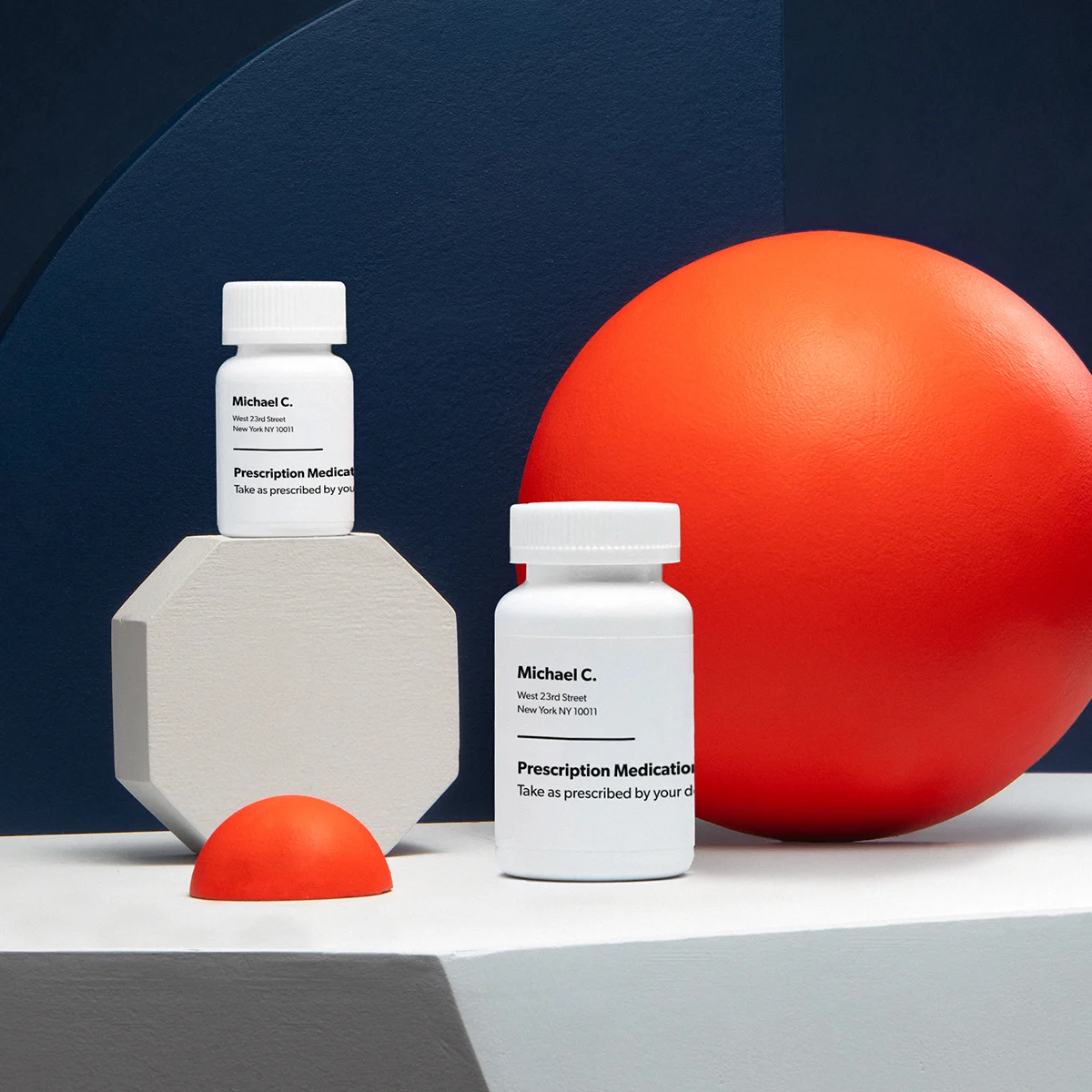Here's what we'll cover
Here's what we'll cover
Here's what we'll cover
In addition to itching, burning, and blisters, abnormal discharge can be another symptom of genital herpes, a common sexually transmitted infection. While some discharge is normal, herpes discharge can be discolored or have an unusual odor. We’ll cover more about herpes discharge, how to tell if your discharge is caused by herpes, and what treatments are available.
What is herpes discharge?
Most of the time, discharge from a penis or vagina is normal. For people with penises, normal discharge can come from pre-ejaculatory fluid or ejaculation. While it may look a little different for everyone, healthy discharge is thick, cloudy, clear, or has a milk-like appearance.
For people with vaginas, discharge is natural and plays a role in keeping the vagina healthy, moist, and protected from infections. Unlike penile discharge, vaginal discharge can look or feel different depending on a person’s age, level of sexual activity, menstrual cycle, and even birth control. For example, discharge can be clear and stretchy during ovulation or be thick and white (without an odor) before menstruation.
In the case of genital herpes, discharge from a penis or vagina can be clear, thick, cloudy, or white and may be accompanied by small amounts of blood. Grey, green, or yellow discharge can also be a sign of herpes. Symptoms like abnormal discharge often appear during a flareup and disappear afterward.
Since genital herpes is passed via skin-to-skin contact and through bodily fluids like semen, saliva, and vaginal discharge, phases when the virus is active and causing symptoms like sores, pain, and unusual discharge can indicate that it’s more contagious.
What is herpes?
Herpes is a common sexually transmitted infection (STI). It can be caused by either the herpes simplex virus type 1 (HSV-1) or type 2 (HSV-2). HSV-1 is the strain usually associated with oral herpes, which causes painful cold sores around the mouth or nose. While not as common, HSV-1 can also spread to the genitals through sexual contact.
In general, herpes simplex virus infections (both 1 and 2) are very common. Around half of people ages 14-49 in the US carry HSV-1 and around 12% of people have HSV-2. There are roughly 600,000 new cases each year, according to the Centers for Disease Control and Prevention. Worldwide, almost 500 million people are infected with HSV-2.
While some people with herpes have more regular outbreaks, many people with herpes experience no symptoms at all, which is known as asymptomatic herpes. Genital herpes symptoms, like abnormal discharge, can be mild or go unnoticed, which is also why some people might not know they’re carrying the virus or even that they could spread it.
If you’ve noticed symptoms like blisters around your genitals, pain when urinating, or unusual discharge, it’s a good idea to see your healthcare provider or visit a local clinic right away. Since herpes is highly contagious, getting properly diagnosed and treated is key to preventing a potential infection from spreading. Also, starting treatment quickly can curb symptoms and shorten an outbreak.
How do you know if your discharge is caused by herpes?
Because herpes discharge can be similar in appearance to regular discharge (clear, cloudy, or white), how can you tell if it’s “normal” or discharge caused by the virus?
Unlike regular discharge, herpes discharge is usually accompanied by a strong, pungent odor often described as “fishy-smelling,” and is typically more potent after having sex. The odor is usually more noticeable in people with vaginas and only during ejaculation for those with penises. Herpes discharge can also be thicker than usual and have a pus-like appearance.
If you haven’t been diagnosed with genital herpes and notice changes in your discharge, the best thing to do is get checked by a healthcare provider or visit a sexual health clinic. Yeast infections and other STIs like chlamydia and gonorrhea can also cause abnormal discharge, which is why it’s important to see a clinician to determine the cause and get appropriate treatment.
In addition to unusual or odorous discharge, an initial herpes outbreak is usually accompanied by other symptoms including:
Burning, itching, or tingling around the genital area
Flu-like symptoms including headache, fever, and body aches
Swollen lymph nodes
Pain or difficulty urinating
Discomfort or pressure around the pelvic area
Small, painful blisters around the genitals, anus, or mouth
Symptoms typically appear within 2-12 days of contracting the virus, but research finds it can take a lot longer (months, even years in some cases) for signs of genital herpes to show up. Genital herpes can also be passed even in the absence of visible symptoms.
How to prevent genital herpes outbreaks
Currently, there is no cure for genital herpes. Many who contract HSV-2 have recurring episodes of genital lesions with or without other symptoms like abnormal discharge for years. The number of outbreaks varies from person to person; some people have multiple each year. For others, the virus lays dormant and they don’t (or rarely) experience symptoms.
While a herpes outbreak can’t always be prevented, there are antiviral medications like acyclovir (Zovirax) that may help prevent future flare-ups. Acyclovir isn’t a cure for genital herpes, but it can curb outbreaks and prevent future flare-ups. Other medications for genital herpes include famciclovir (Famvir) and valacyclovir (Valtrex).
Studies have found that taking antivirals daily (even during asymptomatic periods) can markedly reduce herpes episodes, especially for people who experience frequent outbreaks or have severe symptoms.
There are also triggers that can activate the virus, including injury or irritation to the genitals, menstruation, stress, and fatigue. Some of these factors can’t be changed or helped, but practicing general self-care habits like eating healthfully, getting enough sleep, exercising, and practicing stress reduction techniques (like meditation and yoga, for example) may help ward off future genital herpes outbreaks.
How to treat a genital herpes outbreak
While there is no cure for herpes, there are treatments for it. FDA-approved antiviral medications to treat genital herpes include acyclovir, famciclovir, and valacyclovir. Acyclovir is more commonly prescribed, though all three drugs have been found to be equally effective. Antiviral medications like these work to alleviate pain and help outbreaks resolve faster. They can also be prescribed for continuous usage to prevent future outbreaks.
Herpes outbreaks can clear up on their own, but treating flare-ups with antivirals can help reduce symptoms, shorten the duration of an outbreak, and prevent rare, but life-threatening complications like encephalitis (brain inflammation). A healthcare provider will determine your medication regimen, but typically antiviral drugs are taken for 7-10 days while symptoms are present. If you’re using them for prevention, you’d take them daily regardless of symptoms.
Along with antivirals, NSAIDs (nonsteroidal anti-inflammatory drugs) like aspirin and ibuprofen can be used for pain relief. Other ways to alleviate symptoms and help sores heal during an outbreak are applying cool compresses, washing blisters gently with soap and water (then pat or air dry), and wearing loose-fitting, cotton clothing.
You shouldn’t engage in sexual activity during a genital herpes outbreak as contact can both exacerbate the outbreak symptoms and you are most likely to pass the infection to another person during an outbreak. With every new partner, it’s a good idea to share that you have herpes and explain what measures you can take together to prevent them from catching the virus too.
How to get rid of herpes odor
Abnormal discharge during a herpes outbreak is often accompanied by a strong, “fishy” smelling odor. Regular discharge (particularly for people with vaginas) can also have an odor, but it’s usually mild and not unpleasant.
Of course, many people who experience discharge odor during a herpes outbreak may feel uncomfortable and self-conscious. The first outbreak is usually the worst, lasting for roughly 2-3 weeks, with subsequent ones usually not as severe and shorter-lasting.
While you may not be able to get rid of herpes odor during an outbreak, there are some steps you can take to make things more comfortable and help the outbreak clear up faster:
Keep your genitals and surrounding area clean and dry.
Do not bandage or cover blisters (air can speed up healing).
When washing, avoid soaps, douches, or cleaning products that contain perfumes; look for mild, unscented products.
Since herpes is most contagious during an outbreak, it’s a good idea to avoid sex––even if using a condom. Condoms and sexual lubricants can further irritate a flare-up.
Wear loose-fitting, cotton underwear rather than polyester or tight-fitting clothes which can exacerbate symptoms. When washing clothes, use a gentle detergent.
Make sure to clean your hands thoroughly with mild soap and water before and after contact with open blisters.
Do not pick or scratch blisters; not only is this painful, but it can lead to an additional infection.
Avoid hot tubs or soaking in warm water until the outbreak clears.
Unless recommended by a healthcare provider, do not put creams, lotions, or ointments on the affected area.
Discharge for most people is normal, but if you notice changes in appearance, consistency, or smell, speak with a healthcare professional who can diagnose the source and recommend a course of treatment. An unusual or odorous discharge doesn’t always indicate herpes, but it’s important to find out to prevent the spread of infection if it is.
The best way to prevent herpes transmission is by practicing safe sex. Get tested regularly and use condoms, especially if you’re engaging in sexual contact with new or multiple partners. If you have herpes already, it’s important to communicate that with any new or existing sexual partners so you don’t pass the virus on.
A herpes diagnosis can be scary but know that it’s a common and very treatable condition. Even though genital herpes is often misunderstood and accompanied by a persisting stigma, educating yourself and others can go a long way. By getting the right treatment and practicing safe sex, there’s nothing stopping you from having a fulfilling sex life.
DISCLAIMER
If you have any medical questions or concerns, please talk to your healthcare provider. The articles on Health Guide are underpinned by peer-reviewed research and information drawn from medical societies and governmental agencies. However, they are not a substitute for professional medical advice, diagnosis, or treatment.
References
Albrecht, M. A. (2023). Patient education: Genital herpes (Beyond the Basics). UpToDate. Retrieved from https://www.uptodate.com/contents/genital-herpes-beyond-the-basics/print
Álvarez, D. M., Castillo, E., Duarte, L. F., et al. (2020). Current Antivirals and Novel Botanical Molecules Interfering With Herpes Simplex Virus Infection. Frontiers in Microbiology, 11. doi: 10.3389/fmicb.2020.00139. Retrieved from https://www.frontiersin.org/articles/10.3389/fmicb.2020.00139/full
Groves, M. (2016). Genital Herpes: A Review. American Family Physician, 93(11), 928-934. Retrieved from https://www.aafp.org/pubs/afp/issues/2016/0601/p928.html#afp20160601p928-b3
Mathew, J. & Sapra, A. (2023). Herpes Simplex Type 2. StatPearls. Retrieved from https://www.ncbi.nlm.nih.gov/books/NBK554427/
McQuillan, G., Kruszon-Moran, D., Flagg, E. W., et al. (2018). Prevalence of Herpes Simplex Virus Type 1 and Type 2 in Persons Aged 14–49: United States, 2015–2016. NCHS Data Brief, 304. Retrieved from https://www.cdc.gov/nchs/data/databriefs/db304.pdf
National Health Service (NHS). (2023). Genital herpes. Retrieved from https://www.nhs.uk/conditions/genital-herpes/
Sands-Lincoln, M. & Goldmann, D. R. (2016). Antiviral Drugs to Prevent Clinical Recurrence in Patients with Genital Herpes. The American Journal of Medicine, 129(12), 1264-1266. doi: 10.1016/j.amjmed.2016.08.007. Retrieved from https://www.amjmed.com/article/S0002-9343(16)30837-3/fulltext#articleInformation
Sauerbrei, A. (2016). Optimal management of genital herpes: current perspectives.* Infection and Drug Resistance, 9,* 129–141. doi: 10.2147/IDR.S96164. Retrieved from https://www.ncbi.nlm.nih.gov/pmc/articles/PMC4912341/
Stenzel-Poore, M. P., Hallick, L. M., Fendrick, J. L., et al. (1987). Herpes simplex virus shedding in genital secretions. Sexually Transmitted Diseases, 14(1), 17–22. Retrieved from https://pubmed.ncbi.nlm.nih.gov/3031833/
U. S. Centers for Disease Control and Prevention (CDC). (2021). Genital Herpes – CDC Detailed Fact Sheet. Retrieved from https://www.cdc.gov/std/herpes/stdfact-herpes-detailed.htm#:~:text=How%20common%20is%20genital%20herpes,States%20in%20a%20single%20year.&text=Nationwide%2C%2011.9%20%25%20of%20persons%20aged,%25%20when%20adjusted%20for%20age
World Health Organization (WHO). (2022). Herpes simplex virus. Retrieved from https://www.who.int/news-room/fact-sheets/detail/herpes-simplex-virus










